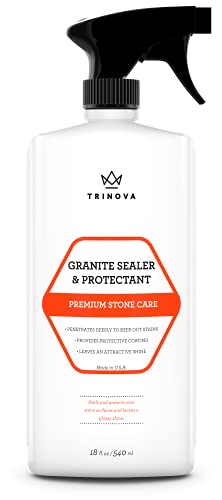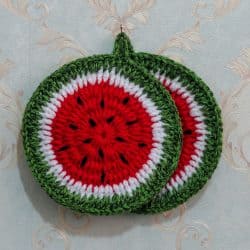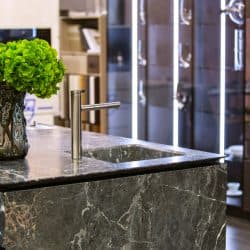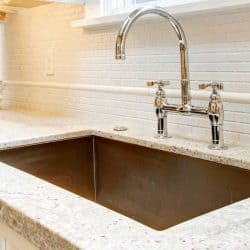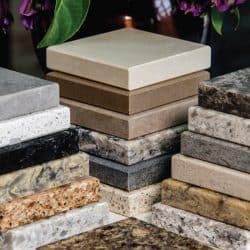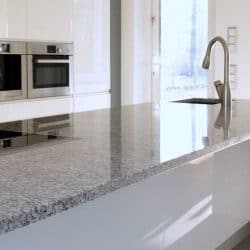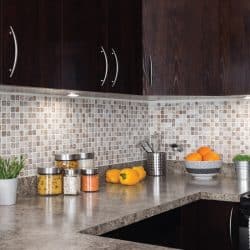Granite is a solid choice in modern kitchen design. However, just because granite is as hard as a rock doesn’t mean it’s impervious to stains. In fact, granite countertops that aren’t adequately sealed are quite porous and could get dirty without frequent cleanings. If you’re wondering how to clean granite countertops properly, then be sure to read through all the info we’ve compiled in this post.
For daily maintenance on your granite countertops, follow this simple cleaning routine:
- Place a few drops of mild dishwashing detergent on a clean, soft rag.
- Wet the rag with a dash of hot water.
- Scrub your countertops with the soapy rag, then dry with another clean towel.
Another great way to keep your granite countertops clean is to spray a 1:1 mix of rubbing alcohol and water onto the surface. Let this solution sit for at least three minutes to disinfect your granite countertop. After the three minutes are up, wipe the countertop with a clean, soft towel.
While both of these cleaning strategies are great for general maintenance, they will not remove stains. If you want to learn more about the do’s and don'ts of cleaning granite, please continue reading.
![An empty kitchen with a granite island countertop with wooden flooring, How To Clean Granite Countertops? [3 Steps]](https://kitchenseer.com/wp-content/uploads/2020/10/How-To-Clean-Granite-Countertops-3-Steps.jpg)
General Tips For Cleaning Granite Countertops
Granite countertops are an excellent long-term investment, but they require constant maintenance. Be sure to use the cleaning tips below to keep your countertops clean.
How Can You Make Granite Shine?
The best ways to preserve a beautiful shine on granite countertops include daily cleanings and occasionally re-applying sealant. Although it may seem too good to be true, putting these preventative strategies into place will ensure your countertops shine for a long time.
The go-to cleanser for granite countertops will always be a mild dishwashing detergent on a soft rag. You could also use a 1:1 mix of rubbing alcohol and water as a safe disinfectant. Both of these cleansers are fine for use daily, provided you use a soft towel for scrubbing and drying.
As for resealing, you should apply a high-quality sealant at least once per year or whenever you notice your countertop getting dull. Be sure to use a little elbow grease to ensure your countertop absorbs the sealant as you’re applying it. It would be best if you also were careful about letting sealant sit for too long as this could cause discolorations. Please be sure to read through your sealant’s instructions before applying it. If you don’t feel like hiring a professional cleaner, check out the many commercially available sealants online.
Find out more on this Amazon link.
What Not To Use On Granite
But it’s not just what you put on granite that makes it shine. It’s equally important to know what not to put on top of your granite countertop. Please avoid using any acidic or ammonia-based cleaners. All of these products will cause serious damage to your granite countertops. A few specific brands you should never use on granite include:
- Windex
- Ammonia
- Lemon
- Vinegar
- 409
- Powder dishwashing detergent
- Lysol or Clorox disinfecting wipes
You should also be careful when cooking or preparing food near granite countertops. Oil splatter is notorious for creating unsightly stains on granite. It’s also common to create stains from drinks like fruit juice, coffee, or tea that drips or spills onto your countertops. Whenever you’re preparing foods, always use a cutting board and do your washing over a sink. It’s also a great idea to place coasters on your countertops and have paper towels on standby in case you spot an accidental spill.
How Do You Clean Granite Countertops Naturally?
The simplest all-natural cleaner for granite countertops is a 1:1 mix of rubbing alcohol and water. Although it may seem too good to be true, this simple mix is a potent cleanser that can safely be used on your countertops every day. Some people like to add a few drops of essential oil and castile soap to this alcohol-based spray for extra cleaning power.
However, if you’re going to use essential oil, it’s best to avoid anything too acidic like lemon or lime. Although citrus fruits have many potent cleansing abilities, they are not granite-friendly. For the longevity of your countertop, please look into non-acidic essential oils like basil, rosemary, or cinnamon, all of which have fantastic antimicrobial properties.
What Is The Best Daily Cleaner For Granite?
A safe way to clean your granite countertops every day is to use a mild liquid detergent on a soft rag. Just pour a few dabs of dishwashing soap on your rag and run it under hot water for a second. Next, scrub all around your granite countertop and dry with another towel. Add a little more soap and water as you move along your countertop.
Is Dawn Dish Soap Safe For Granite?
Dawn dishwashing detergent is one of the best brands you could use for cleaning granite countertops. Place a few dabs of this soap on a soft rag, dampen the towel with a bit of hot water, and scrub your countertops. You could use this simple technique for everyday cleaning or to get rid of mild stains.
Find out more on this Amazon link.
If you want to learn more about maintaining granite countertops, be sure to read Are Granite Countertops Durable And Easy To Maintain.
Check out the video below for an overview of what we've just discussed.
What Happens If Granite Countertops Are Not Sealed?
Sealing granite countertops is a lot like waxing a car. Both of these procedures help repel unwanted grime and moisture, which keeps these materials clean for as long as possible. When you don’t seal granite countertops, it’s easier for liquids, oils, or dirt to leach in your stone. This means your countertops will have a higher risk of unsightly stains and damage. Thankfully, there are many fantastic sealants for granite now available online.
Find out more on this Amazon link.
When Should Granite Countertops Be Sealed?
As a rule of thumb, you should think about resealing your granite countertops once per year. However, if you notice your granite countertops looking a little worse for wear, please feel free to seal ahead of schedule. Please read through this post Do Granite Countertops Need To Be Sealed [And How To Do That] to find an excellent DIY test you could use to determine when your countertops need resealing.
What Disinfectant Can Be Used On Granite?
The safest disinfectant to use on granite countertops is a homemade 1:1 blend of 70-percent isopropyl alcohol and water. Place this mixture in a spray bottle and give your granite countertop a few spritzes about once per day. If you want the alcohol to have its maximum disinfectant effects, you should let it stand for a minimum of three minutes before wiping it with a soft rag. Letting your rubbing alcohol sit for longer will ensure it kills all potential pathogens lurking in your granite.
Although rubbing alcohol is a safe disinfectant on granite, you can also use a diluted mix of bleach and water a few times per year. According to Clorox, it’s safe to use ½-cup of regular bleach per gallon of water. For the best results, spray this solution on your countertops and let it sit for about five minutes. Once the five minutes are up, wipe away with a soft rag.
Please keep in mind there is a chance even diluted bleach could stain granite countertops. If you’re concerned about using this method, spray a bit of this solution in a test area far from public view. After you scan this small area for stains, you should feel more confident about applying the bleach mixture to your countertop.
While we’re talking about disinfectants, don’t forget that there are a few commercially available products that are safe for use on granite.
Click this Amazon link for more details.
Can You Use Lysol Wipes On Granite Countertops?
Lysol disinfecting wipes are too harsh to use on granite countertops. This is especially true if these wipes have a strong citrus scent. Any acidic compounds will cause damage to your countertop’s sealant. To make matters worse, Lysol wipes contain traces of ammonia, which also harms granite countertops.
Getting Rid Of Stains On Granite Countertops: The Ultimate Tips
No matter how careful we are when it comes to cleaning our countertops, sometimes spills happen. Thankfully, there are many DIY strategies you could use to clear away stains from your gorgeous granite. Here are a few tips to keep in mind if you ever notice stains on your countertops.
How Do You Get A Stain Out Of Granite?
The easiest way to get rid of a stain on granite is to make a cleansing paste called a poultice. Although it may sound fancy, it’s not all that difficult to make this safe cleaning agent at home. In fact, you probably already have everything you need to make a basic granite poultice.
The most common DIY poultice is a blend of baking soda and water. Mix in just enough water to your baking soda to create a thick paste that resembles sour cream. Once you’ve got your poultice prepped, place it over your stain and cover with plastic wrap. After one day, remove the plastic wrap and wipe the poultice with a clean rag. You could re-apply this mix as many times as you want until the stain goes away.
Although this baking soda method is the most common way to get rid of stains, you could also make a poultice with one cup of all-purpose flour, two to three tablespoons of Dawn dishwashing soap, and just enough water to make a thick paste. Use this poultice the same way you’d use the baking soda mix.
For extremely stubborn stains, you could mix the baking soda with a dab of 3% hydrogen peroxide. Just be careful with this method because hydrogen peroxide could cause discoloration on dark granite. If you’re worried about how this will affect your countertops, be sure to test hydrogen peroxide in an inconspicuous area before applying to a broader area.
Lastly, don’t forget that there are prepackaged granite poultices now available online.
Please click this Amazon link for more info.
Does Water Stain Granite?
Water can stain granite, especially if your countertops aren’t well-sealed. Since granite is naturally porous, any standing water left on your countertop could get absorbed and leave a mark. This is especially true if you spill a dark-colored liquid and leave it standing for an extended period. If the water that comes out of your faucet has a high mineral content (e.g., well water), it’s also possible for hard watermarks to appear on granite. Typically, these hard water stains look like white spots near your sink.
The simplest way to remove deep-set water stains from a granite countertop is to use a mix of baking soda and enough water to make a sticky paste. When this DIY poultice is ready, spread it over the water stain and cover it with plastic wrap. Let this mixture sit for at least 24-hours before removing it with a slightly damp towel. If you still see a stain, then try this method one more time.
Some granite specialists also recommend using a straight-edge razor blade on hard water stains. Simply use the edge of this blade to scrape away all of the marks you see. Once all of the stains have been cleared, wipe them away with a damp rag.
Of course, prevention is the best strategy to avoid water staining. Be extra careful when handling dark liquids like juice, coffee, or tea on your countertops. If it helps, place a few coasters on your countertop to avoid accidental water from seeping into your stone. Whenever you notice a stain on your countertop, please wipe it away immediately.
Can Discolored Granite Be Fixed?
In most cases, you can get rid of discolored marks on your granite countertop with a few DIY cleaning strategies. One technique that tends to work well on discolorations is applying a bit of hydrogen peroxide to a clean, soft cloth and rubbing it into the stain. For the best results, use 12-percent hydrogen peroxide on your countertops.
Another common way people get rid of granite stains is to make a paste with about one cup of flour, ½-cup of hydrogen peroxide, and a few tablespoons of cold water. Once this paste is well incorporated, place it on your stain and cover it with plastic wrap. Let this mix sit overnight and remove it with a clean towel the next day.
There are also many granite-safe sponges online that customers could use to scrub away stains without leaving scratches behind. Consider using one of these granite-approved sponges with a bit of mild dishwashing detergent on discolorations.
Find out more on this Amazon link.
As always, it’s best to prevent discolorations if you can. Strive to give your granite countertops regular cleanings with mild dish detergent on a wet rag. You should also regularly check if your granite needs to be resealed.
Can Cloudy Granite Be Fixed?
Like discolorations, cloudy marks could be fixed depending on the extent of the damage. There are many potential reasons for cloud films on granite, but here are a few of the most common explanations:
- Using improper cleansers like lemon, vinegar, or ammonia-based products.
- Deep-set oil marks from cooking.
- Hard water stains.
- Letting your sealant sink into your granite rather than buffing it out.
When you notice cloudy streaks on your granite, you should first try to get rid of it with mild dishwashing detergent on a slightly wet rag. You could also mix a paste of baking soda and water, apply it to the stain, and let it sit under plastic wrap for one night. The next morning, wipe away this baking soda mix with a damp rag to see if any marks remain.
Some people have also reported success using a paste made with cornstarch and water. Apply this mixture as you would the baking soda method and see if it pulls off the cloudy marks. This technique is especially useful for clearing away grease stains.
If all of these cleaning methods don’t work, you could always call a granite professional for personalized assistance.
Stay On Top Of Your Granite Countertop Cleaning Routine
When it comes to cleaning granite, the most important thing to remember is to avoid acidic or ammonia-based cleaners. Both of these products will wear away at your sealant and could leave nasty stains behind. Instead, it’s best to use mild dishwashing detergent and diluted rubbing alcohol for your daily cleaning needs. If you have stains on your granite countertops, we strongly recommend trying the baking soda poultice method a few times.

